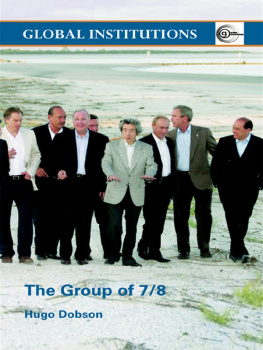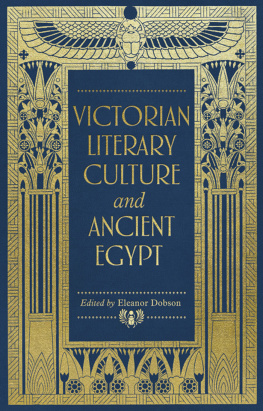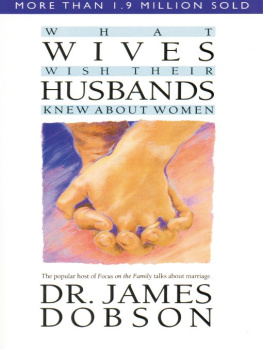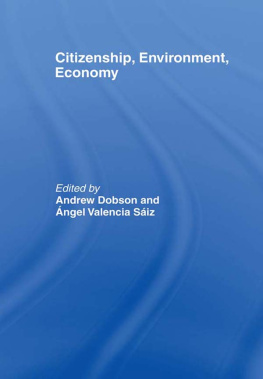Hugo Dobsons new book, The Group of 7/8, is a highly accessible, up-to-date introduction to the history, present and future of the G7/8 summits. Part of Routledges leading Global Institutions Series, this book aims to explore the role that the G8 plays and will play in global governance.
The general consensus amongst researchers is to deny that the G8 is an institution and should therefore not be included in topics such as global governance. Dobson describes it as the worlds biggest think-tank on global governance; unlike any legalized established institution, the Group of 7/8 acts as a forum where ideas can be floated, discussed, and if successful, delegated to the relevant body for implementation.
So, how can one begin to understand the G8 and its position in global governance? Hugo Dobson proceeds to examine this question in terms of the G8s relationship to the more formal and truly institutionalized mechanisms of global governance; like the United Nations (UN), World Bank (WB) and World Trade Organization (WTO). Divided into six instructive chapters, this book provides an innovative and informative contribution to understanding the dynamics of global governance and is especially relevant to promoting this area of investigation in the future.
To ensure this broad appeal and accessibility, Dobsons holistic understanding of the summit is addressed through thematic points of reference and key texts are highlighted in an annotated bibliography.
The Group of 7/8:
- addresses the history and development of the summit; organization and functioning; perspectives of member states; achievements and failures; criticisms and challenges and future directions
- draws upon extant literature in order to provide the reader with a single, more concise point-of-entry
- acts as a guide to the broader field of research and provides suggested further reading.
Written in a clear and structured manner, The Group of 7/8 is a core introductory guide and an essential purchase for students and professionals alike in the field of international relations.
Hugo Dobson is a Senior Lecturer at the National Institute of Japanese Studies and School of East Asian Studies, University of Sheffield.
The Global Institutions Series
Edited by Thomas G. Weiss
(The CUNY Graduate Center, New York, USA) and
Rorden Wilkinson
(University of Manchester, UK)
The Global Institutions series is designed to provide readers with comprehensive, accessible, and informative guides to the history, structure, and activities of key international organizations. Every volume stands on its own as a thorough and insightful treatment of a particular topic, but the series as a whole contributes to a coherent and complementary portrait of the phenomenon of global institutions at the dawn of the millennium.
Books are written by recognized experts, conform to a similar structure, and cover a range of themes and debates common to the series. These areas of shared concern include the general purpose and rationale for organizations, developments over time, membership, structure, decision-making procedures, and key functions. Moreover, current debates are placed in historical perspective alongside informed analysis and critique. Each book also contains an annotated bibliography and guide to electronic information as well as any annexes appropriate to the subject matter at hand.
The volumes currently published or under contract include:
The United Nations and Human Rights (2005)
A Guide for a New Era
by Julie A. Mertus (American University)
The UN Secretary-General and Secretariat (2005)
by Leon Gordenker (Princeton University)
United Nations Global Conferences (2005)
by Michael G. Schechter (Michigan State University)
The UN General Assembly (2005)
by M.J. Peterson (University of Massachusetts, Amherst)
Internal Displacement
Conceptualization and Its Consequences (2006)
by Thomas G. Weiss (the CUNY Graduate Center) and David A. Korn
Global Environmental Institutions (2006)
by Elizabeth R. DeSombre (Wellesley College)
UN Security Council
Practice and Promise (2006)
by Edward C. Luck (Columbia University)
The World Intellectual Property Organization
Resurgence and the Development Agenda (2007)
by Chris May (University of the West of England)
The North Atlantic Treaty Organization (2007)
by Julian Lindley-French (European Union Centre for Security Studies)
The International Monetary Fund (2007)
by James Raymond Vreeland (Yale University)
The Group of 7/8 (2007)
by Hugo Dobson (University of Sheffield)
The World Economic Forum
A Multi-Stakeholder Approach to Global Governance (2007)
by Geoffrey Allen Pigman (Bennington College)
The International Committee of the Red Cross
A Unique Humanitarian Actor
by David P. Forsythe (University of Nebraska) and Barbara Ann Rieffer Flanagan (Central Washington University)
UN Conference on Trade and Development
by Ian Taylor (University of St. Andrews)
A Crisis of Global Institutions?
Multilateralism and International Security
by Edward Newman (United Nations University)
The World Bank
From Reconstruction to Development to Equity
by Katherine Marshall (Georgetown University)
The African Union
Past and Future Governance Challenges
by Samuel M. Makinda (Murdoch University) and Wafula Okumu (McMaster University)
The Organisation for Economic Cooperation and Development
by Richard Woodward (University of Hull)
Non-Governmental Organizations in Global Politics
by Peter Willetts (City University, London)
Multilateralism in the South
An Analysis
by Jacqueline Anne Braveboy-Wagner (City College of New York)
The European Union
by Clive Archer (Manchester Metropolitan University)
The International Labour Organization
by Steve Hughes (University of Newcastle)
The Commonwealth(s) and Global Governance
by Timothy Shaw (Royal Roads University)
The Organization for Security and Co-operation in Europe
by David J. Galbreath (University of Aberdeen)
UNHCR
The Politics and Practice of Refugee Protection into the Twenty-first Century
by Gil Loescher (University of Oxford), James Milner (University of Oxford), and Alexander Betts (University of Oxford)
The World Health Organization
by Kelley Lee (London School of Hygiene and Tropical Medicine)
The World Trade Organization
by Bernard Hoekman (World Bank) and Petros Mavroidis (Columbia University)
The International Organization for Standardization and the Global Economy
Setting Standards
by Craig Murphy (Wellesley College) and JoAnne Yates (Massachusetts Institute of Technology)
The International Olympic Committee
by Jean-Loup Chappelet (IDHEAP Swiss Graduate School of Public Administration) and Btrenda Kbler- Mabbott
For further information regarding the series, please contact:
Craig Fowlie, Publisher, Politics & International Studies
Taylor & Francis
2 Park Square, Milton Park, Abingdon
Oxon OX14 4RN, UK












